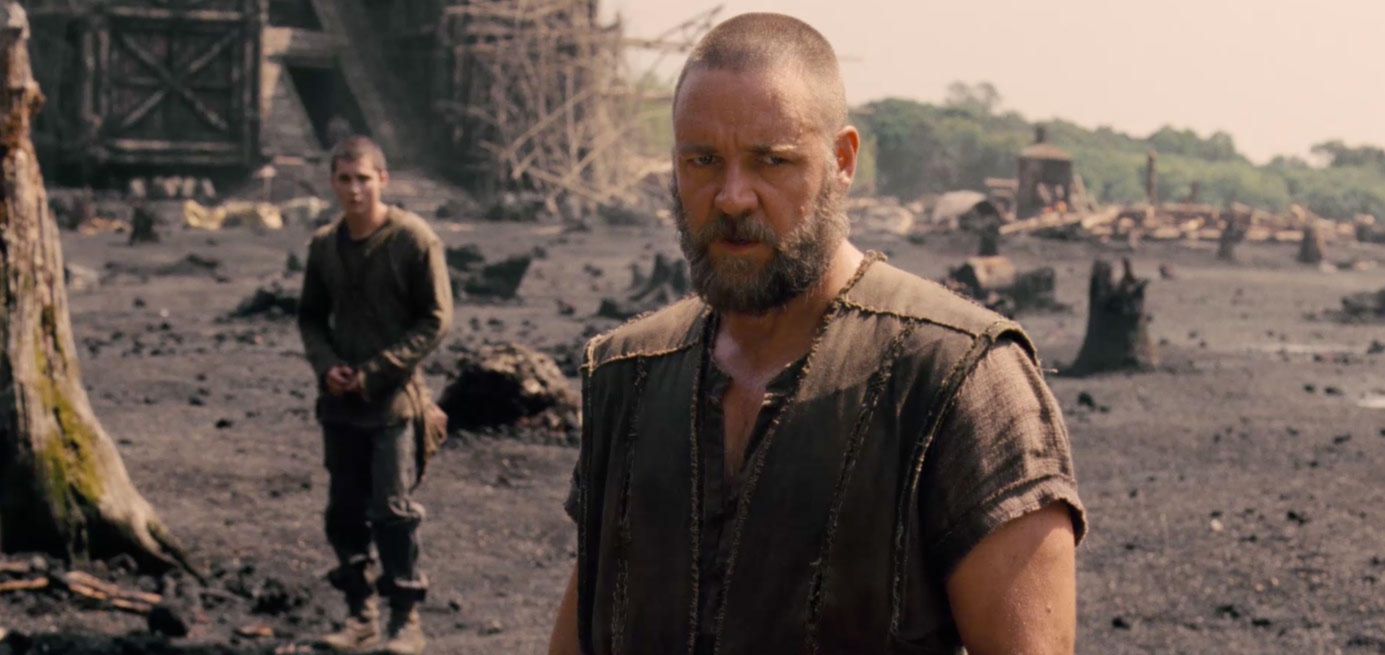
It pains me to have to say that Darren Aronofsky’s latest film is his first misfire, and quite a substantial one at that. Aronofsky is one of the most interesting and innovative American filmmakers working today – Pi, The Wrestler and Requiem for a Dream are among my favourite films – yet Noah is a bloated feature that says little about faith or family, steeped in average dialogue that dulls the often dazzling visuals. It’s worth looking at as a curio, of sorts, of studio-backed insanity, in contrast with his underfunded and impressive The Fountain. Noah has some strong ambition, yet its intentional disregard for conventional pacing and accessible structure are undermined by an adherence to clichéd dialogue and poorly constructed emotional arcs.1
A primary flaw in the film is that it remains, from its opening scene, predominantly uncompelling. Noah as a figure exists with greatest clarity perhaps in an audience member’s vague recollection of biblical lore, rather than in Crowe’s on-screen version. We lack insight and true connection or depth. That said, the glimpses into his mind are the most arresting sequences, the madness and delusion all-encompassing and engrossing. When this element slips away, the characterisation is derivative and, unfortunately, boring. The film tethers itself to the biblical narrative skeleton, but in doing so ignores organic emotional stakes. Even The Fountain, Aronofsky’s earlier visual extravaganza, relied as much on character and emotion as its effects and structural conceit.
The film may have benefitted from a reduction of exposition. Though it starts off in an almost beguilingly sudden fashion, the reliance on overwrought dialogue and unnecessary clarification bogs down the pace of the film. Though it seems to be Aronofky’s stab at The Tree of Life, moving into Malick territory may have improved the feature. A more spare sense of dialogue and an emphasis on powerful visual motifs over explanatory scenes would have, at the very least, forced the audience to engage on a more intellectual level with regards to interpretation. It seems an odd jump, too, from Black Swan‘s pared-down narrative and focus on tension to Noah‘s overwritten and overly broad narrative. The loss of intimacy with characters, in particular Noah himself, is very problematic for true engagement with the film.
The visual style of the film is haphazard. At times it is dark and grey, at others washed in so much orange and blue that it feels like a movie poster come to life. The occasional handheld sequences remind us that Aronofsky is in charge but they are few and far between, at least in the distinctive usages of camera movement. The visual effects, though, are very impressive. The ‘visions’ are engaging and the flood itself is mammoth in scope and execution. There is a stunning sequence that comes almost out of nowhere that recreates part of the Book of Genesis and one can only wish that the rest of the film had followed that course. Visual experimentation is integral to the better moments in the film, the fractious montage style something unique amongst the other derivative elements within. With regards to the DVD transfer itself, it looks really good, to the naked eye almost on par with an average blu-ray.
The acting performances in the film are poor across the board. Crowe moves in and out of accents but seems to have set the bar at ‘vaguely British’, with everyone else following suit. Jennifer Connolly is too good an actress for that role, and the lack of emotional complexity renders her big scenes almost laughable. Anthony Hopkins also suffers at the hands of poorly written dialogue, his fixation on berries painfully contrived, whilst Ray Winstone plays a one-note villain. It should also be noted that Clint Mansell delivers a truly disappointing score, filled with bombast and unable to lift any scene in which it is employed.2
Overall, Noah is an intriguing (if tedious) mess of a movie, and could have used some more ruthless editing or a more abstract and sparse plot. The influence of a studio upon the film, especially when considering the budget, must have been significant, yet this cannot entirely be used as an excuse for the mishmash of ideas and artistic techniques on display. This isn’t Aronofsky’s Southland Tales, nor even his John Carter; whilst it may have some of the ambition of those films, it lacks the emotional and/or intellectual hook that has allowed each of those famed flops to endure.
Around the Staff:
| Dominic Barlow | |
| Felix Hubble |
